七年级下册unit4第二课时
冀教版七年级英语下册教案Unit 4 第2课时

第二课时Lesson 20Join Our Club! 课时目标戏。
7.Join us today or stop by the pool to learn more.今天就加入我们或顺便到泳池边来了解更多情况吧。
教学难点了解不同俱乐部的信息;能用英语描述自己所在的或想加入的俱乐部自主学习一、根据句意及首字母提示写出单词。
1.Are you interested in drawing pictures? Come and join us!2.If you don't know how to improve your thinking skill, we can help you.3.Why are you late for the important meeting?4.I think doing exercises is useful for you.5.We are a good team, though we are at different levels.二、写出下列画线短语的汉语意思。
1.Chess challenges you and makes you think hard.努力思考;凝神思考2.We do lots of role play games in our classes.许多,大量;角色扮演3.Join us today or stop by the pool to learn more.顺便到……来教学过程环节1新课导入教师展示几张与俱乐部有关的图片,然后提问并让学生思考,然后和同桌一起讨论自己参加的俱乐部。
T:What clubs are they, do you know? Now, you can have a discussion with your partners.S1:In Picture 1, it's a camping club.I join the camping club in our school, and you?S2:No, I am not in this club.I am in the chess club now....T:OK! Today we will know more about clubs.设计意图:以图片导入话题,使课堂更具趣味性;通过让学生讨论不同的俱乐部,调动学生参与课堂的积极性,活跃课堂氛围,从而循序渐进地引入本课时的话题,为接下来的学习做好铺垫。
人教版最新版七年级下册unit4 Don't eat in class section A period2 2d-3c
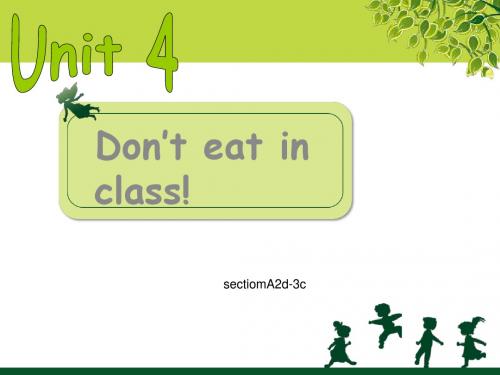
5. 我们可以在教室里吃东西吗? _____________________________ Can we eat in the classroom? 6. 不能。但我们可以在餐厅里吃东西。 ________________________________ No, we can’t, but we can eat in the ________________________________ dining hall. 7. 我们可以在上课的时候带帽子吗? _____________________________ Can we wear a hat in class?
Don’t sit down. Don’t come in.
Don’t eat in the hallways.
5. Do your homework on Sunday night.
Don’t listen to music in class.
Don’t do your homework on Sunday night.
No talking!
Don’t smoke!
No smoking!
in the classroom
Don’t eat in the classroom.
in the library
Don’t take your schoolbags to the library! No schoolbags!
是有区别的, 和大部分情态动词一样,
can在否定句中, 直接在can后加上not,
在疑问句中, 把can放到主语前面,
并且没有人称和数的变化。
3. late “迟, 晚” (形容词或副词) e.g. Why are you late? 你为什么迟到? Sorry, I come late. 对不起, 我来晚了。 be late for+n. (对)„„迟到 e.g. Don't be late for work / class /meeting.
英语人教版七年级下册Unit 4 Don't eat in class.2b
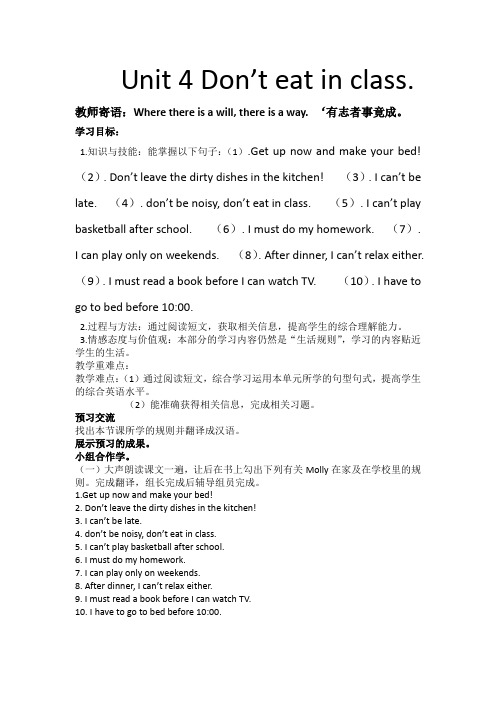
Unit 4 Don’t eat in class. 教师寄语:Where there is a will, there is a way. ‘有志者事竟成。
学习目标:1.知识与技能:能掌握以下句子:(1).Get up now and make your bed! (2). Don’t leave the dirty dishes in the kitchen! (3). I can’t be late. (4). don’t be noisy, don’t eat in c lass. (5). I can’t play basketball after school. (6). I must do my homework. (7).I can play only on weekends. (8). After dinner, I can’t relax either. (9). I must read a book before I can watch TV. (10). I have to go to bed before 10:00.2.过程与方法:通过阅读短文,获取相关信息,提高学生的综合理解能力。
3.情感态度与价值观:本部分的学习内容仍然是“生活规则”,学习的内容贴近学生的生活。
教学重难点:教学难点:(1)通过阅读短文,综合学习运用本单元所学的句型句式,提高学生的综合英语水平。
(2)能准确获得相关信息,完成相关习题。
预习交流找出本节课所学的规则并翻译成汉语。
展示预习的成果。
小组合作学。
(一)大声朗读课文一遍,让后在书上勾出下列有关Molly在家及在学校里的规则。
完成翻译,组长完成后辅导组员完成。
1.Get up now and make your bed!2. Don’t leave the dirty dishes in the kitchen!3. I can’t be late.4. don’t be noisy, don’t eat in class.5. I can’t play basketball after school.6. I must do my homework.7. I can play only on weekends.8. After d inner, I can’t relax either.9. I must read a book before I can watch TV.10. I have to go to bed before 10:00.(二)1.小组长组织学员学习课文,讨论短文意思并勾画出重点和难点。
人教版初一英语七年级下册英语七下 Unit 4 Period 2
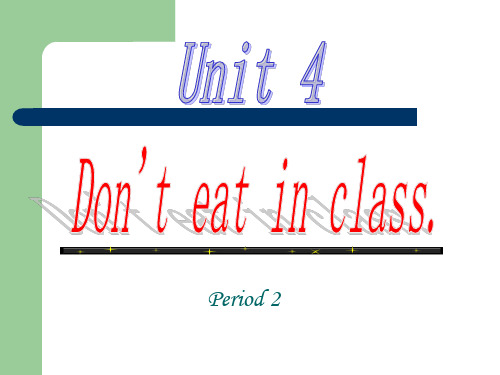
A. Do, does B. Can, do C. Do, can D. Can, can
3. You can’t eat _____ outside.
A. at
B. \
C. in D. on
4.Listen to music in hallways.(改为否定句)
Don’t listen to music in hallways. 5.Don’t arrive late for class.(改为同义句)
can
√ 5. ___ eat in the dinning hall
can
6. ___ eat outside
can
√ 7. ___ wear a hat
can
√ 8. ___ fight
can
can’t
can’t can’t can’t
can’t can’t can’t can’t
情态动词can的用法
7.在图书馆保持安静 6. have to do sth.
7.be quiet in the library
1.This is my first day of school. 2.There are a lot of rules. a lot of = lots of 3.What are some of the rules?
can/ can’t + 动词原形 表示 能做某事 fight with sb 和某人打架
2c Student A is Alan. Student B
is Cindy. Talk about the rules
in 2a.
Well, we can’t listen to music
人教版七年级下册英语Unit4第2课时(SectionA Grammar Focus-3c)-最新
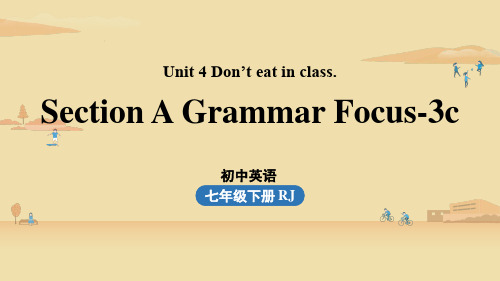
Look at the pictures in 3a and answer the questions.
1. What can’t students do in
1
3 picture 2?
祈使句的否定句 怎样构成?肯定 句呢?
祈使句的否定句在动词原 形前加don’t,表示“不要 做什么事”。
祈使句的肯定句通常是以 动词原形开头的。
Don’t run in the hallways. Don’t fight.
What are the rules?
We must be on time for class.
we
eat
in
the
classroom?
No, we can’t, but the dining hall.
we
can
eatLeabharlann inCan we wear a hat in class? Yes, we can./No, we can’t.
Does he have to wear a uniform at school?
Don’t run in the hallways. Don’t fight.
What are the rules?
We must be on time for class.
Can we eat in the classroom?
No, we can’t, but we can eat in the dining hall.
Can
we
eat
in
the
classroom?
No, we can’t, but the dining hall.
we
can
Unit4第二课时教案-2023-2024学年牛津上海版英语七年级下册

- 自主学习法:引导学生自主思考,培养自主学习能力。
- 信息技术手段:利用在线平台、微信群等,实现预习资源的共享和监控。
- 作用与目的:帮助学生提前了解一般过去时态的用法,为课堂学习做好准备。培养学生的自主学习能力和独立思考能力。
2. 课中强化技能
教师活动:
- 导入新课:通过讲述一个有趣的故事,引出一般过去时态的用法,激发学生的学习兴趣。
核心素养目标分析
本节课旨在培养学生的英语学科核心素养,包括语言能力、文化意识、思维品质和学习能力。
1. 语言能力:通过阅读和讨论,学生能够运用一般过去时态描述过去的事件,提高他们的口语表达能力和写作能力。
2. 文化意识:通过学习故事中Inventor的创新精神,学生能够了解和尊重不同的文化背景,培养跨文化交际的能力。
在教学过程中,我将引导学生通过阅读理解故事内容,学习一般过去时态的构成和用法。通过小组讨论和互动,学生能够运用一般过去时态描述过去发生的事情。在课堂活动中,我将鼓励学生积极参与,提高他们的口语表达能力和团队合作能力。
在教学资源方面,我将使用多媒体教具如PPT和视频,以增加学生对课程的兴趣和参与度。同时,我会设计一些互动游戏和练习,使课堂氛围更加活跃,帮助学生更好地理解和运用所学知识。
3. 随堂测试:设计一份随堂测试,包括选择题、填空题和简答题,以评估学生对一般过去时态的掌握程度。测试内容应涵盖时态的构成、用法和实际运用。
4. 作业完成情况:评估学生完成作业的质量和速度。检查学生是否能正确运用一般过去时态,并在作业中展示出对故事内容的理解。
5. 学生自我评价与反思:要求学生对自己的学习过程和成果进行自我评价和反思。评估学生是否能识别自己的不足,并提出改进建议,以促进自我提升。
译林牛津版七年级下册英语Unit 4 Period 2 Reading

④Birdsmakebeautifulsoundswhentheysing.
考点4 sound/saʊnd/n. 声音 e.g. Wecan’thearanysound. 我们一点声音都听不到。
一语辨异:Icouldhardlyhearanysoundexcepthis voicebecausenoonemadeanoise. 除了他的说话声,我几乎听 不到任何声音,因为大家都很安静,没有任何的嘈杂声。
Thestoryisamazing, soIcanrememberit.
这个故事很令人吃惊, 因此我能记住它。
remember+ 名词/ 代词, 表示“记得……”。
Pleaseremembertoturnoffthelightswhenyouleave. 当你离开的时候请记得关灯。remember to do sth. ,记着
B2HerearesomedescriptionsaboutSunshineZoo. WriteaTifasentenceistrueoranFifitisfalse.
1ThestudentsstarttheirvisitfromtheNorthGate. _______ 2Pandasdonotliketoliedownalldaylong. _______ F 3Visitorscannotgonearthelions. _______ F 4Thebirdsinthezooareveryquiet. _______
B4MillieistellingherfriendWendyonlineaboutSunshineZo o. Completetheirconversationwiththeinformationonpage 44.
七年级英语下人教版 Unit4 Section A 第二课时教学设计
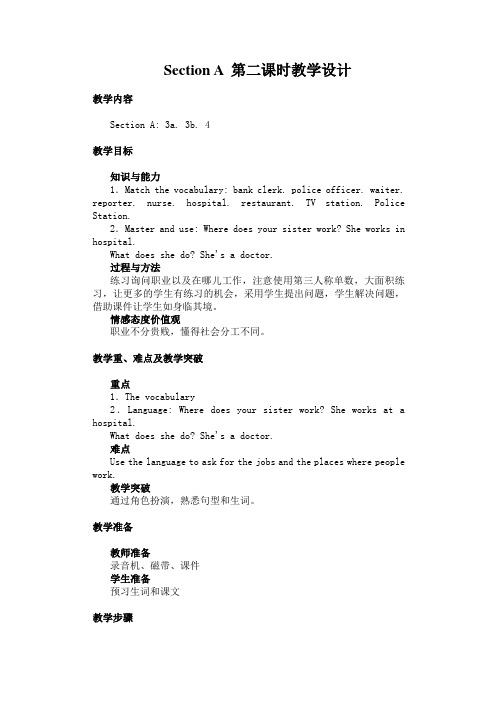
Section A 第二课时教学设计教学内容Section A: 3a. 3b. 4教学目标知识与能力1.Match the vocabulary: bank clerk. police officer. waiter. reporter. nurse. hospital. restaurant. TV station. Police Station.2.Master and use: Where does your sister work? She works in hospital.What does she do? She's a doctor.过程与方法练习询问职业以及在哪儿工作,注意使用第三人称单数,大面积练习,让更多的学生有练习的机会,采用学生提出问题,学生解决问题,借助课件让学生如身临其境。
情感态度价值观职业不分贵贱,懂得社会分工不同。
教学重、难点及教学突破重点1.The vocabulary2.Language: Where does your sister work? She works at a hospital.What does she do? She's a doctor.难点Use the language to ask for the jobs and the places where people work.教学突破通过角色扮演,熟悉句型和生词。
教学准备教师准备录音机、磁带、课件学生准备预习生词和课文教学步骤本课小结本节课学习了20个单词如:nurse, a lot of, money, mine, count, patient, angel, dangerous, thief, afraid,be afraid of, station, TV station, police station, pop star, late, out, go out. Where does he work? He woks in ahospital. 通过学习学生已经掌握了职业和工作地点的句子。
译林牛津版七年级下册英语Unit 4 课时2 Reading I

32. Shegoestothezoobybus.(对画线部分提问) __________________she_________tothezoo?
Howdoesgo
五、完形填空。 Londonissuchawonderfulcity. Itisverylarge. TheThames
A 35. A. becauseB. orC. soD. but 36. A. speakB. tellC. sayD. talk
C
Lastyear, whenI_______37inLondon, Imetoneofthethickestfogsinyears. Youcouldhardly______38yourhandinfrontofyourface.
16. Lookatthe_____A_. Theyareverytall. A. giraffesB. giraffe C. monkeysD. monkey
17.—Wearegoingtovisitthezoothisafternoon.
—______! Showmesomephotoswhenyouareback. A
基础巩固练
28 Don'tbe 29 don't; cango 30 goesto; onfoot 31 ride; to 32 Howdoes; go
能力提升练
答案呈现
33 B 38 C
34 A 39 D
35 A 40 D
36 C 41 B
37 C 42 B
43 B 44 D 45 B 46 A 47 C
und.
30. Simonwalkstothesupermarket.(改为同义句)
人教版七年级下册英语Unit4 Section A 第2课时
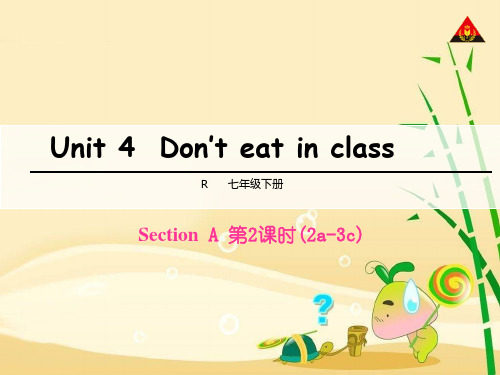
Can I wear a hat in the classroom. I have a very beautiful hat.
2c
No, you can’t. And you must not fight with your classmates. It will destroy your fellings.
Language points
一.祈使句
1.含义:该句经常用来表示请求、命令、叮嘱、 建议等,谓语动词用原形,句子没有主语,句子 使用感叹号或者句号 。
2.句子结构
(1)肯定句:行为动词原形+其他。
如:Listen to me, please. 请听我说。
Language points
(2)否定句:Don’t+be或行为动词原形+其 他。如:Don’t eat in the classroom.
2d. Role-play the conversation.
Hi, John. I'm Alice. This is a great school, but there are a lot of rules. Hi, my name's John. It's my first day at school.
3a
Write the rules for the school library.
Library Rules ______ Don’t listen to music. 3. _________________ Don’t eat or drink. 4. _________________ Don’t take photos.
3b
Listen to music? (we/can/in the hallways) Can we listen to music in the hallways Q: __________________________ No, we can’t. A: __________________________
七年级英语下册Module4unit2课件
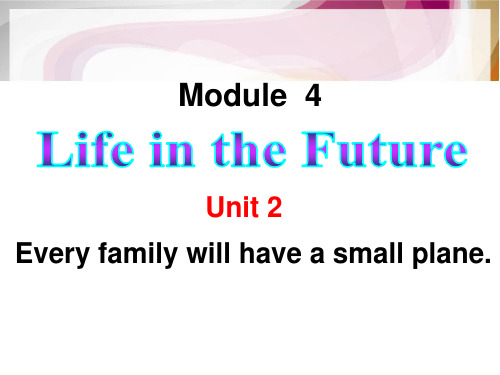
阅读A段完成填空
A:
In the future, We will new ____ kind____ of wear a ____ clothes. The change of weather _______ won't mean a clothes change of ________.
A: In the future, a change of weather won’t mean a change of clothes. We’ll wear a new kind of clothes. They’ll be warm when we’re cold, and cool when we’re hot. a kind of 一种,一 change "变化”,“改变”可数。“零钱” 不 可数 作动词时 change...for..."用.....换....." 我用我的旧电脑换了一部手机。 I change my old computer for a telephone. change...into..."把.....变成....." 我能把冰变成水。
Will there be traffic jam in the air? ?
2. not only…but also…用于连接两个表示并列关系的成
分,着重强调后者,其意为“不仅……而且…”;
She not only plays well, but also writes music. 若连接两个成分作主语,其谓语通常与靠近的主语保持 一致。如: Not only you but also he has to leave.
阅读B段完成填空
B: The weather will be quite warm or even____ hot all ______ heavy_____ rian year, with_____ and wind. The sea _____ level as _____. well will rise __
人教版英语七年级下册unit4donteatinclasssectiona2

⼈教版英语七年级下册unit4donteatinclasssectiona2Unit4 SectionA(2d-3c)教案1.0 Teaching analysis教情分析1.1Teaching objectives教学⽬标1.1.1Language goals 语⾔⽬标1.1.1.1 Key Words and Chunks1.1.1.1.1 For applying: important, bring, quiet1.1.1.1.2 For comprehending: uniform1.1.1.2 Sentence Structures1) What are the rules? We must be on time for class.2) What do you have to do? We have to be quiet in the library.3) Don’t run in the hallways. Don’t fight.4) Can we wear a hat in class? Yes, we can./No, we can’t.5) Can we eat in the classroom? No, we can’t, but we can eat in the dining hall.6) Does he have to wear a uniform at school? Yes, he does./No, he doesn’t.7) It’s my first day at school.8) This is a great school, but there are a lot of rules.9) What are some of the rules?10)Can we bring music players to school?11) And we always have to wear the school uniform.12) Oh, and we also have to be quiet in the library.13)At my dream school, we don’t have to come to school every day.1.1.1.3 Grammar Focus1)This is a great school, but there are a lot of rules.(there be句型表⽰“某地有某物”,其主语为物品或处所,be动词遵循就近原则;a lot of=lots of 意为“许多、⼤量”既可以修饰可数名词,⼜可以修饰不可数名词。
人教版七年级英语下册unit4课件2
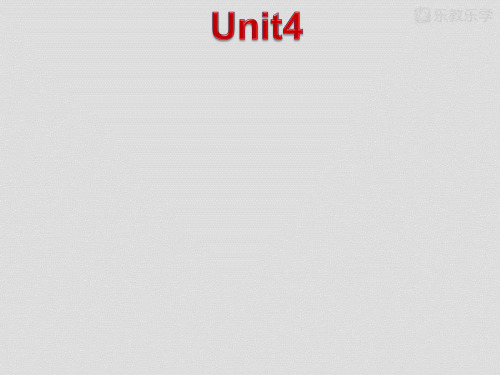
Bepolitetoeachother. Wearschooluniform. Don’tbelateforschool.
Don’tsayruderemarksinschool. Don’teatsnacksinclass. Don’tshoutinclass.
阅读GrammarFocus部分,完成下列句子。 1.不要在楼道里跑。 ______________________________ Don’truninthehallways. 2.不要打架。 ____________________ Don’tfight. 3.有什么规则? Whataretherules? ______________________________ 4.我们必须按时上课. Wemustbeontimeforclass. _______________________________
Wemustbequietinthec omputerroom.
Don’trunintheco mputerroom.
Wearslippersintheco mputerroom. Don’teatordrink inthecomputerro om.
ComputerRules 1.___________________________________ 2.___________________________________ Wemustbequietinthecomputerroom.
Cleanthecomputerroomeveryday.
1.Hehastoeatbreakfastquickly.(改为一般疑问 句) __________________________________ 句型转换 2.Playvolleyballafterclass.(改为否定句) ________________________________
Unit4Canyouswim?Period2单元整体教学设计

1. 教学方法
1. 讲授法:通过系统的讲解,使学生掌握一般现在时态和运动类动词短语的用法。针对重点知识,如疑问句结构,通过示例和对比分析,帮助学生理解和记忆。
2. 讨论法:组织学生进行小组讨论,让学生在讨论中练习使用功能句型“Can you...?”和回答技巧。鼓励学生相互提问、回答,提高他们的口语交流和解决问题的能力。
d. 通过小组活动,学会与他人合作交流,提高学生的团队协作能力。
二、核心素养目标
1. 语言能力:通过学习本章节,使学生能够熟练掌握与运动相关的动词短语,运用一般现在时态进行交流,提高学生的英语表达和运用能力。
a. 能够听懂、说、读、写动词短语,如:swim, ride a bike, fly a kite, dive, play the guitar。
根据反思的结果,我将制定相应的改进措施。如果发现学生对一般现在时态的疑问句结构掌握不够扎实,我会增加相关的练习和讲解,确保学生能够熟练运用。如果发现学生对运动类动词短语的记忆存在问题,我会设计一些有趣的游戏或活动,帮助他们巩固记忆。
在未来的教学中,我将尝试更多样化的教学方法,如小组合作、角色扮演等,以提高学生的学习兴趣和参与度。同时,我也会更加注重学生的个别差异,给予他们个性化的指导和支持。
2. 教学内容:
a. 能听懂、会说、会读、会拼写与本课相关的动词短语,如:swim, ride a bike, fly a kite, dive, play the guitar。
b. 掌握一般现在时态的肯定句、否定句和疑问句结构,并能运用到实际情境中进行交流。
c. 了解并运用本课功能句型:“Can you...?”和“Yes, I can./ No, I can't.”来询问和回答他人是否会做某事。
(新)牛津译林版七年级英语下册Unit 4 第2课时(导学+习题)课件
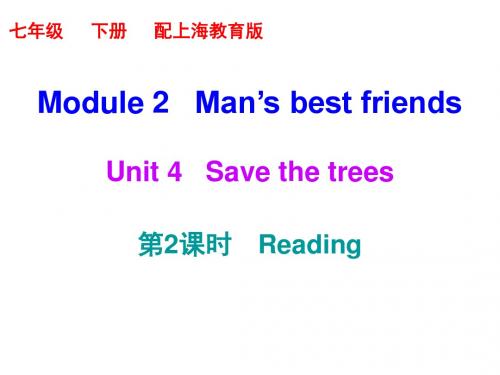
in many ways 在许多方面
【例句】
If you can do these things consistently, you will be rewarded
in many ways. 如果你能一贯坚持做到这些,那么你将会在许 多方面得到奖励。
【拓展】
by the way 顺便说一下 on the way to... 在去„„的途中 in a way 在某种程度上 in this way 用这种方法 【应用】用by the way, in a way或on the way填空 By the way could you tell me the way to the hospital? (1)__________, (2)__________, In a way you win. On the way to school, I saw a little dog lying on the (3)__________
量)。
【例句】
It’s not right to cut down the trees. 砍树是不对的。
Millions of people are starving now in the world. 当前世界上
仍有数百万的人在挨饿。
【拓展】
与millions of类似的短语有:
hundreds of 数以百计的thousands of 成千上万的
5. 没有树,我不能想象这个世界是什么样的。
I can’t imagine a world without trees. ________________________________________________
要点精讲
【1】They help us in many ways. 它们在很多方面帮助我 们。 【用法】
牛津译林版七年级英语下册Unit 4 Reading2 课件
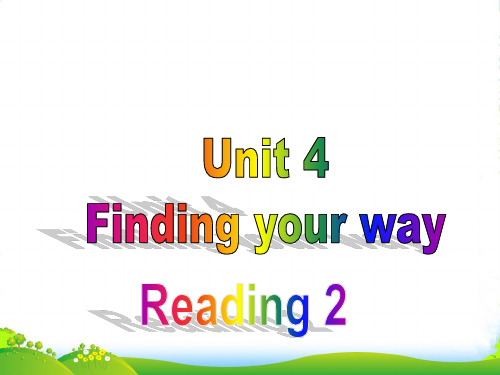
They think _(_t_h_a_t_) _t_h_e_y_ _a__r_e_ right
恐怕他们不会欢迎像你这样的拜访者。 I’m afraid (_t_h_a_t)_t_h_e_y _w_o_n_’_t _w_e_l_c_o_m_e_v_i_s_it_o_r_s_like you.
I like to _______ _______ _______
hear birds sing
4 all day long 里面的long 是副词, 用在表示一段时间的名词之后,其强调作用。 他们常年辛勤工作。
Theyw__o_r_k_ _h_a_r_d__a_ll_ _y_e_a_r_ _lo__n_g_.
2 remember that they’re dangerous 记住他们很危险。 “that”是宾语从句的引导词,无词义, 可以省略,就是说一个句子的宾语不是一个词而是句子时 用that, 他说他是个老师
He says _(_t_h_a__t)__h__e_ __i_s__ a teacher.
B( ) 2.Hongkong is the ___ of China. A.to / east B.in / south C.on / west D.in / north
D( ) 3.Taiwan is _____ the southeast of China. A. on B.to C.at D.in
__m_a__k_e_/_le__t/_h_a__v_e_/_h_e_a_r_/_s_e_e__s_b__d__o__s_t_h_.
这里have sb do sth 意思是”使某人做某事 “
请请让让他我走跟你pl一ea起se走_l。_e_t_h__im___go
2024七年级英语下册Unit4Lesson2习题课件新版冀教版

【点拨】根据空后的 “like the art club, the music club and the sports club”可知,空处应填clubs。
18. 莉莉经常帮助家人干家务。 Lily often ___h__el_p_s__ her family __w__it_h_/d__o_ ___h_o_u_s_ew__o_r_k_____ .
19. 我急着赶去电影院, 所以我的晚饭吃得很快。 I was ___i_n_____ _____a____ ___h_u_r_r_y__ to the movie theater, so I _____h_a_d__ __s_u_p_p_e_r_/_d_in_n__er_ quickly.
But a middle school in Zhengzhou 12 ___B____ a
different club for students.
12. A. visited B. started C. met D. missed 【点拨】句意为“但是郑州的一所中学为学生们 开办了一个与众不同的俱乐部”。visit 参观; start 开办;meet 遇见;miss 错过。根据句意可 知是“开办了一个俱乐部”,故选B。
The weather was 2. ___c_lo_u__d_y__ (cloud). It was a little far, so we went there 3. ____b_y____ bus. Along the way we saw lots of interesting things.
新人教版七年级英语下册Unit4第二课时学案

Unit4.第二课时1.课题概说:本节课我们继续讨论学校规则,掌握must与have to的不同用法。
2.基础词汇:important重要的,bring带来,取来player播放器,运动员,night晚上uniform校服,制服,quiet 安静的,out外出,dish碟,盘3.必备词组:a lot of...许多的some of... ...中的一部分be late for...因...而迟到bring...to...把...带到... have to必须,不得不be quiet 保持安静4.课文鸟瞰:朗读对话,然后回答后面的问题。
John: Hi, my name’s John .It’s my first day at school .Alice: Hi, John .I’m Alice .This is a great school ,but there are a lot of rules .John: Really ?What are some of the rules ? Alice: Well ,don’t be late for class .This is very important .John: OK, so we must be on time. Can we bring music player to school ?Alice: No ,we can’t .And we always have to wear the school uniform .John: I see .Alice: Oh, and we also have to be quiet in the school library .根据短文内容,回答问题:1)What rules are there in John’s new school?2)Do you like these rules ?What rules do you want to have in your school?5.【巩固练习】用下面的提示词完成问句,并根据你的学校的情况进行回答。
- 1、下载文档前请自行甄别文档内容的完整性,平台不提供额外的编辑、内容补充、找答案等附加服务。
- 2、"仅部分预览"的文档,不可在线预览部分如存在完整性等问题,可反馈申请退款(可完整预览的文档不适用该条件!)。
- 3、如文档侵犯您的权益,请联系客服反馈,我们会尽快为您处理(人工客服工作时间:9:00-18:30)。
5. what else do you want? 你还想要其他什么? else:其他的。 一般用于特殊疑问词之后 , Who else do you know in his class? 6. help him with English= help him learn English help后面的 动词不定式省略to.
Yes, he does.
What do you have to do?
We have to be quiet in the library. 不准照相。 We must be on time for class.
在图书馆安静。
4. Don’t take photos.
5. 我们必须准时
到校。
have to 用法注意 1
错题 回顾 1. Can you fight outside? ( C A.I’m afraid so. 2. 我觉得你家的约束太多了。 I think you have________ ________ too many rules at your home. 3. He has ______ (do) the dishes after dinner to do ) C. No, never
• 当have to 用于疑问句和否定句中时,要根 据情况添加助动词。 • 例1: I have to go now.(陈述句) Do you have to go now? 一般疑问句: 否定句: I don’t have to go now. • 例2:He has to run.(陈述句) • 一般疑问句: Does he have to run? • 否定句:He doesn’t have to run.
have to 后接动词原形 eg: I have to do my homework. I have to be quiet. 当主语是第三人称单数时,have to 变为 has to eg: She has to do her homework. He has to be quiet.
have to 用法注意 翰,我是 爱丽丝。这是一所极好的学校,但是有许多规则。 真的吗?规则 当中的一些是什么? 嗯,不要上课迟到。这是非常重要的。
Hi, my name’s John, It’s my first (序数词前加the, 但当前面有形容词性物主代词时不加the) day at school.
doesn’t _______ have to go. She _______
错题 回顾
1. That’s too bad: 那太糟糕了。用于听到不好消息时所说的话。 2. wait for ; 等候、、、、。 3. answer: 回答。 4. write the rules for your school: 为你的学校写些规则。
好吧,所以我们必须准时。我们可以带音乐播放器到学校吗? 不,我们不可以。并且我们总是不得不穿校服。 我明白了。 奥,并且我们也不得不在图书馆里保持安静
OK, so we must be on time. Can we bring music players to school? No, we can’t. And we always have to wear the school uniform. I see.
Oh, and we also have to be quiet in the library.
1、我们能在教室 吃东西吗? 2、他必须穿校服 吗? 是的。 3、你们必须做什 么?
Can we eat in the classroom?
Does he have to wear a uniform ?
be quiet
保持安静
A;What do you have to do?
(你们不得不做什么)
B:We have to be quiet.
play the guitar 弹吉他 A;What does your sister have to do? (你不得不做什么) B:She has to play the guitar.
3 I have to do to school.(改为一般疑问句)
Do you have to go to school? ________ ________ ________ 4. Mary has to do the cleaning at home on weekends, (改为一般疑问句) Does Mary ________ have to do the cleaning at home on weekends? _______ 5. She has to go. (改为否定句)
have to用法举例
do my homework 做我的作业
A;What do you have to do?
(你不得不做什么)
B:I have to do my homework.
clean her room 打扫我的房间 A;What does she have to do? (你们不得不做什么) B:He has to clean her room.
1.Write your name on the list.(改为否定句) Don’t ________your write ________ name on the list.
2 Go to the bus stop.(改为否定句)
Don’t go ________ ________ to the bus stop.
B. Yes, I can.
Hi, John, I’m Alice. This is a great school, but there are(有) a lot of rules. Really ? What are some of the rules?
Well, don’t be late for class. This is very important.
